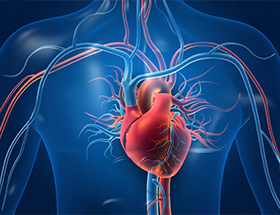- 11/12/2023
- by AiMS Hospital & Research Center
- Latest Blog
Dealing with coronary artery disease (CAD) poses significant challenges. It arises when plaque accumulates in the arteries supplying the heart, leading to their narrowing, which can cause chest pain (angina) and, in severe cases, trigger a heart attack. However, CAD can often progress silently without any noticeable symptoms until the disease is well advanced.
CAD, also known as heart disease or coronary heart disease, contributes to approximately 805,000 heart attacks annually and leads to around 696,000 deaths in the U.S. each year.
Given the common occurrence and often silent nature of heart disease until it manifests, recognizing the factors contributing to your risk is crucial.
Factors that increase the risk of heart disease can be classified into two categories: uncontrollable and controllable. Uncontrollable risk factors include gender (being male), advancing age, family history of heart disease, being postmenopausal, and race (African American, Native American, and Mexican American individuals are at higher risk).
Conversely, controllable risk factors revolve around lifestyle choices. These factors encompass smoking, unhealthy cholesterol levels, uncontrolled high blood pressure, physical inactivity, obesity (having a BMI over 25), unmanaged diabetes, uncontrolled stress, depression, anger, poor diet, and alcohol use.
Reducing your risk of heart disease is achievable through simple lifestyle modifications, which research indicates can prevent more than half of heart disease cases. Adopting these changes not only diminishes the risk of heart attack and stroke but also enhances overall physical and mental well-being.
To mitigate your risk of heart disease:
Quit Smoking: Smoking significantly elevates the risk of heart attack. Even exposure to secondhand smoke poses a risk.
Improve Cholesterol Levels: Maintaining healthy cholesterol levels through diet, exercise, and, if necessary, medication can lower the risk of heart disease.
Control High Blood Pressure: Employ lifestyle changes and medications as advised by your doctor to manage blood pressure effectively.
Manage Diabetes: Ensure proper control of diabetes through diet, exercise, weight management, and prescribed medications.
Engage in Physical Activity: Regular exercise significantly reduces the risk of heart disease. Aim for at least 30 minutes of moderate exercise daily.
Adopt a Heart-Healthy Diet: Embrace a diet low in sodium, saturated fats, trans fats, and refined sugars while increasing consumption of fruits, vegetables, nuts, and whole grains.
Limit Alcohol Intake: Moderation in alcohol consumption is recommended for heart health.
Maintain a Healthy Weight: A balanced diet and regular exercise aid in achieving and maintaining a healthy weight, thereby reducing heart disease risk.
Manage Stress: Employ stress-reduction techniques such as meditation, yoga, therapy, and effective time management.
Discussing your lifestyle choices and family medical history with your doctor will enable the formulation of a tailored plan to mitigate your risk factors for heart disease.



